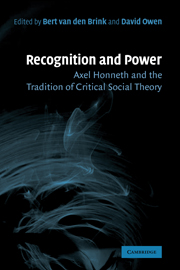Book contents
- Frontmatter
- Contents
- List of Figures and Tables
- Contributors
- Acknowledgments
- 1 Introduction
- PART I PHILOSOPHICAL APPROACHES TO RECOGNITION
- PART II RECOGNITION AND POWER IN SOCIAL THEORY
- PART III RECOGNITION AND POWER IN POLITICAL THEORY
- PART IV AXEL HONNETH ON RECOGNITION AND POWER
- 13 Recognition as Ideology
- 14 Rejoinder
- Bibliography
- Index
13 - Recognition as Ideology
Published online by Cambridge University Press: 24 July 2009
- Frontmatter
- Contents
- List of Figures and Tables
- Contributors
- Acknowledgments
- 1 Introduction
- PART I PHILOSOPHICAL APPROACHES TO RECOGNITION
- PART II RECOGNITION AND POWER IN SOCIAL THEORY
- PART III RECOGNITION AND POWER IN POLITICAL THEORY
- PART IV AXEL HONNETH ON RECOGNITION AND POWER
- 13 Recognition as Ideology
- 14 Rejoinder
- Bibliography
- Index
Summary
In the same measure that the concept of recognition has become the normative core of several different emancipation movements over the last several years, so have there also been increasing doubts as to its critical potential. This theoretical skepticism has doubtlessly been fostered by the experience that we live in a culture of affirmation in which publicly displayed recognition often bears the marks of mere rhetoric and has the character of being a mere substitute. The act of praising certain characteristics or abilities seems to have become a political instrument whose unspoken function consists in inserting individuals or social groups into existing structures of dominance by encouraging a positive self-image. Far from making a lasting contribution to the conditions of autonomy of the members of our society, social recognition appears merely to serve the creation of attitudes that conform to the dominant system. The reservations entertained with regard to this new critical approach thus amount to the thesis that practices of recognition don't empower persons, but subject them. We could summarize this objection by saying that through processes of reciprocal recognition, subjects are encouraged to adopt a particular self-conception that motivates them to voluntarily take on tasks or duties that serve society.
These fundamental reservations recall the considerations that moved the Marxist theoretician Louis Althusser more than thirty years ago to find the practice of public recognition to be the common mechanism of all forms of ideology.
Information
- Type
- Chapter
- Information
- Recognition and PowerAxel Honneth and the Tradition of Critical Social Theory, pp. 323 - 347Publisher: Cambridge University PressPrint publication year: 2007
Accessibility standard: Unknown
- 118
- Cited by
